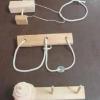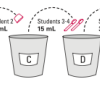Search Results
Showing results 101 to 120 of 141

An Interdisciplinary Deer and Human Population Study
Source Institutions
This activity helps the learner answer the question: "What environmental problems arise due to animal and human overpopulation and what might need to be done to combat these problems?" Learners play a

Phylogenetics
Source Institutions
This activity lets learners participate in the process of reconstructing a phylogenetic tree and introduces them to several core bioinformatics concepts, particularly in relation to evolution.

Puzzled Partners
Source Institutions
In this web-based activity, learners try to figure out who in an online chat room has their matching puzzle piece.

Mission: Control!
Source Institutions
In this activity and game, learners will train to improve balance and spatial awareness by performing throwing and catching techniques on one foot.
Tree Poker
Source Institutions
In this activity (p.14-15 of PDF), learners discover the concepts of competition and limiting factors as they relate to plant and animal communities.

Exploring Fabrication: Self-Assembly
Source Institutions
In this activity, learners participate in several full-body interactive games to model the process of self-assembly in nature and nanotechnology.

Topological Puzzles
Source Institutions
In this activity, learners construct three math puzzles out of simple materials like wood, string, and Styrofoam.

Scram or Freeze
Source Institutions
In this outdoor activity and animal-role-play game, learners discover and uncover the hidden world of "cryptozoa"—organisms such as spiders, salamanders and slugs that live under objects, like rocks a

Great Steamboat Race
Source Institutions
In this outdoor activity, learners race small boats, made of cork, balsa wood, popsicle sticks etc., to investigate the rate and direction of currents in a stream or creek.

Probability: Remove One
Source Institutions
In this math lesson, learners are given 15 chips and a number line labeled from 2-12.

Quick Frozen Critters
Source Institutions
In this activity, learners play an active version of freeze tag based on predator/prey relationships.

A System of Transport
Source Institutions
In this activity about the human heart (on page 5 of the PDF), learners work in teams to simulate the volume of blood moved through the circulatory system by transferring liquid into--and through--a s

Population Study Game: Oh, Deer!
Source Institutions
In this activity, learners model a population of deer and see how the number of deer changes over time.

Shake It!
Source Institutions
In this outdoor activity that can be combined with a hike, learners try to match a "mystery community" by shaking animals out of different trees and shrubs.

Zoo Calendar
Source Institutions
Use the Zoo Calendar (page 1 of PDF) to involve learners in interdisciplinary, whole language, and writing activities about ecological concepts.

Follow the Scent
Source Institutions
In this outdoor, sensory activity, learners role play as animals trying to identify their "family's" scent and locate their "territory." Learners mark their territories and sniff out other territories

Cool It
Source Institutions
In this outdoor activity/game, learners use thermometers to simulate how lizards survive in habitats with extreme temperatures.

Artificial Intelligence: The Intelligent Piece of Paper
Source Institutions
This activity explores what it means for a computer to be intelligent and introduces the topic of what a computer program is and how everything computers do simply involves following instructions writ

What's the Risk?
Source Institutions
To discover the risk and protective factors involved in substance addiction, learners play a game of chance to determine whether a fictitious child is likely or unlikely to abuse drugs.

Logs to Soil
Source Institutions
In this outdoor activity, learners cut through and investigate rotten logs and then make log-profile puzzles for each other.
